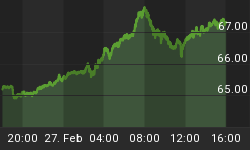The Fed has recently expressed a desire to begin winding down its Quantitative Easing program in the next few months. This would be the first step towards the eventual raising of interest rates. Mr. Bernanke and the other members of our central bank believe the normalization of interest rates would occur within the context of robust markets and rising GDP growth.
However, it seems the Fed has only succeeded in duping some perennial bulls (and possibly even trying to convince itself) into believing that ending QE and the subsequent increase in rates would not adversely affect the economy...but markets are not so easily fooled. Their threat of reducing mortgage and Treasury purchases caused the yield on the U.S. Ten-Year Note to rise from 1.6% on May 2nd, to 2.23% by June 12th. The sharp percentage jump in borrowing costs caused markets to quake around the globe.
European and Asian bond yields became unglued and equity markets retreated across the board. For example, the Power Shares emerging market sovereign debt fund plunged 12% in the last 30 days. In addition, the Italian MIBTEL dropped 10% in less than one month and the Nikkei Dow plunged over 20% from its May 22nd level. Interest rate sensitive stocks in the U.S. took a tumble as well. Utility stocks dropped over 10% since the start of May. Homebuilders like The Ryland Group dropped 19%, while Toll Brothers shed 15%. If there was any doubt how the real estate market would fare under a rising interest rate environment the selloff in real estate stocks settled that debate. Markets are telling the central bank in clear terms that rising rates will crush equities, bonds and economies once the crutch derived from artificial interest rates is removed.
There are unanticipated and unintended consequences from the central banks' manipulation of interest rates. The Yen carry trade is one of them. Investors borrowing Yen to purchase assets denominated in other currencies has been a common trade under Abenomics--the economic recovery strategy adopted by Japan's Prime Minister that uses currency destruction and inflation as a substitute for viable growth. However, the addiction to low interest rates and a falling Yen becomes massive once protracted. Therefore, a forced and panicked unwinding proves to be devastating.
In the U.S., rising interest rates will be pernicious as well. This is because our debt cannot be serviced at much higher interest rates without engendering another severe recession/depression. Household debt as a percentage of GDP was 80% at the end of Q1 2013. That's higher than any period of time prior to Q1 2003 and twice as high as it was when Nixon broke the gold window in 1971. More importantly, the government deficit for 2013 will be the 5th greatest in U.S. history and the total national debt is currently $16.8 trillion, which is 105% of GDP and the highest level since 1948.
The Fed is aware of the above data; but up until recently has refused to publicly recognize the danger of increased borrowing costs. Instead, the central bank persisted in its quest to convey to markets the notion that it can allow rates to rise without significant consequences. But perhaps the recent market reaction to trial balloons regarding the attenuation of QE has shaken the Fed's demeanor.
A correspondent for the WSJ and noted mouthpiece for the Fed wrote the following in recent blog; "Federal Reserve officials have been trying to convince investors for weeks not to overreact when the central bank starts pulling back on its $85 billion-per-month bond-buying program. An adjustment in the program won't mean that it will end all at once, officials say, and even more importantly it won't mean that the Fed is anywhere near raising short-term interest rates." His commentary sent the Dow Jones soaring 180 points and Ten-Year yields to drop sharply the same day of its release.
A relatively small advance in the Ten-Year Note (63 basis points) towards its inevitable average of over 7% caused the Fed to backpedal on its plan to wind down QE. The fact is the Fed cannot allow rates to rise unless it is also willing to let a deflationary depression reconcile the economic imbalances created over the past few decades.
Most importantly, the biggest surprise is yet to come for the Fed. Mr. Bernanke and co., will learn in a relatively short amount of time that they do not control long-term interest rates no matter how they may try. Inflation and record debt levels; or an eventual selling off of the Fed's balance sheet will send interest rates on the long end of the curve soaring.
Expect unprecedented turmoil in global markets when that inevitability occurs.















